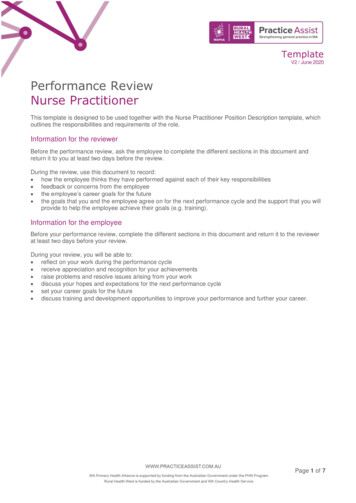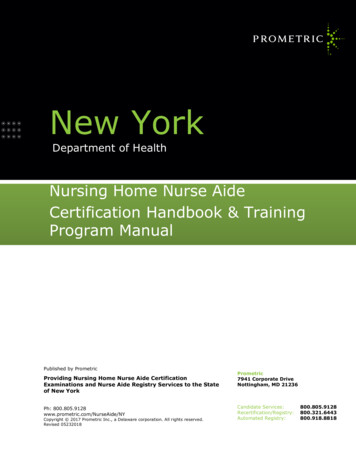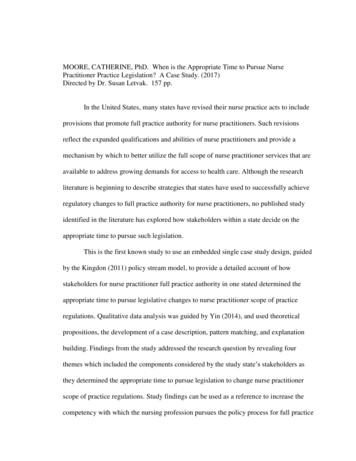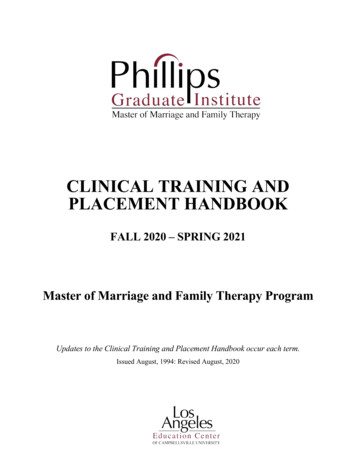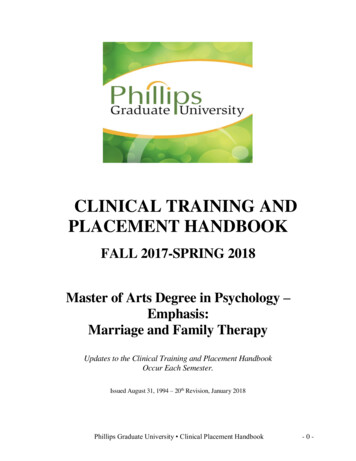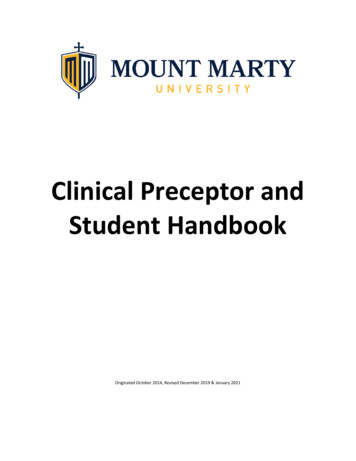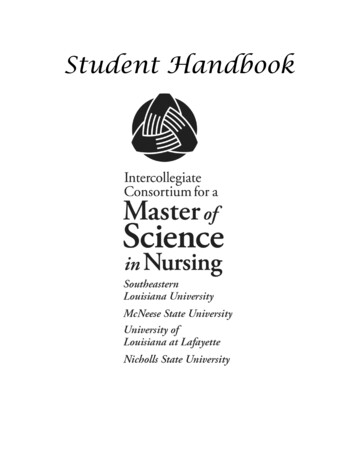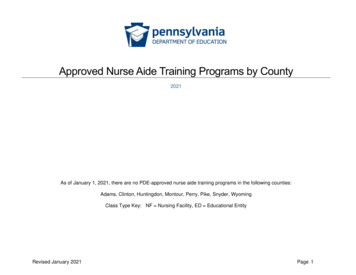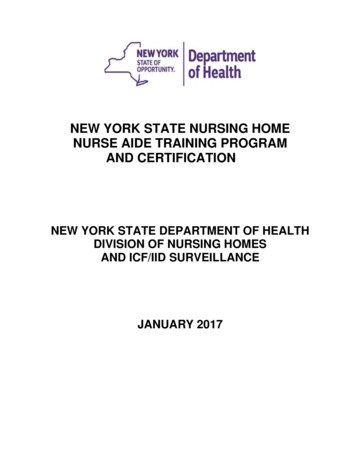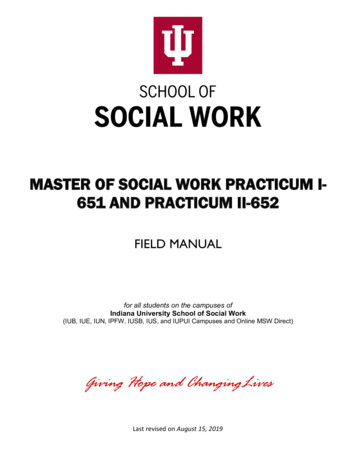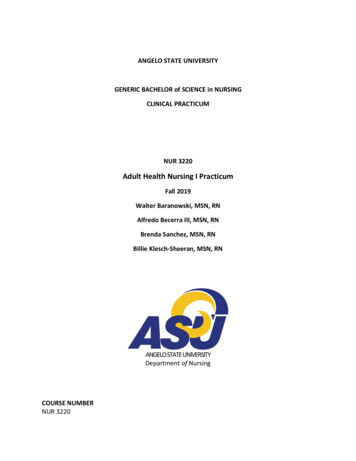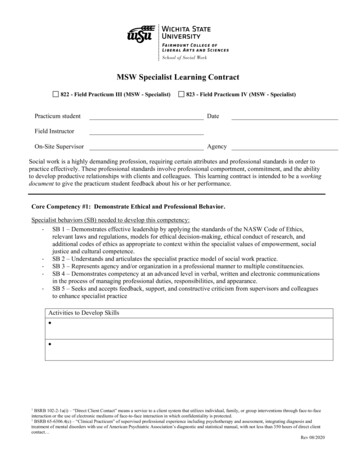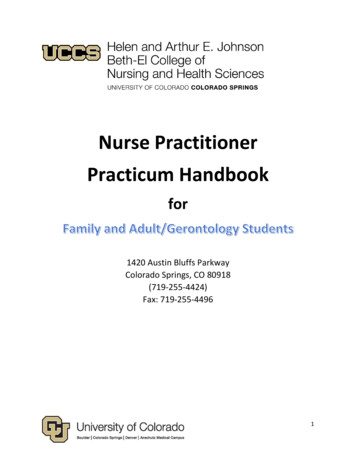
Transcription
Nurse PractitionerPracticum Handbookfor1420 Austin Bluffs ParkwayColorado Springs, CO 80918(719-255-4424)Fax: 719-255-44969/18 cgt, 1/20 cgt, 10/20 cgt, 12/20cgt1
Table of ContentsIMPORTANT CONTACT INFORMATION . 3ARTICLE I: NP CLINICAL PRACTICUM EXPERIENCE . 4Section A: Overview of Clinical Practicum Experience. 4Section B: Requirements for Clinical Practicum Experience . 4Section C: Expectations for the Clinical Practicum . 5Section D: Attendance at Clinical Practicum . 7Section E: Professional Behavior & Dress at Clinical Practicum . 7ARTICLE II: CLINICAL COURSES . 8Section A: Student Objectives for Practicum . 8Section B: Overview for NP Clinical Practicum Courses . 9Section C: Requirements for Primary Care Courses . 11ARTICLE III: PREPARING FOR PRACTICUM . 11Section A: Guidelines for Setting-Up a Practicum Rotation. 11Section B: Suggested Clinical Sites . 13Section C: Clinical Education Agreement/Clinical Site Sheet . 13Section D. Documentation of Clinical Experiences . 14ARTICLE IV: CLINICAL PRACTICUM EVALUATION . 15Section A: Medatrax . 15Section B: Preceptor Evaluations . 156Section C: Site Visitor Evaluation . 166Section D. Students not meeting the minimum requirements . 167Appendix A . Error! Bookmark not defined.89/18 cgt, 1/20 cgt, 10/20 cgt, 12/20cgt2
IMPORTANT CONTACT INFORMATIONPlease call the faculty at the Helen and Arthur E. Johnson Beth-El College of Nursing if you have anyquestions.NURSING DEPARTMENT CHAIRDeborah Pollard, PhD, RNC-OB, CNE, IBCLCAssociate ProfessorChair, Department of NursingHelen and Arthur E. Johnson Beth-El College of Nursing and Health SciencesUniversity of Colorado Colorado Springs (UCCS)Tel: 719-255-3755dpollard@uccs.eduNURSING DEPARTMENT ASSOCIATE CHAIRGRADUATE PROGRAM COORDINATORCarole Traylor, DNP, APRN, CPNP-PCAssistant ProfessorHelen and Arthur E. Johnson Beth El College of Nursing and Health SciencesUniversity of Colorado Colorado SpringsTel: 719-255-4095ctraylor@uccs.eduCLINICAL PRACTICUM COORDINATORMEDATRAX COORDINATORDenise Ostovich, MSN, MPA, RNHelen and Arthur E. Johnson Beth-El College of Nursing and Health SciencesUniversity of Colorado Colorado SpringsTel: 719-255-4473mostovic@uccs.eduPROGRAM ASSISTANTS FOR GRADUATE PROGRAMDiane BuschProgram Assistant/Affiliation Agreement Coordinator Clinical Agency LiaisonHelen and Arthur E. Johnson Beth-El College of Nursing and Health SciencesUniversity of Colorado Colorado Springs1420 Austin Bluffs PkwyColorado Springs, CO 80918Tel: 719-255-4424Fax: 719-255-4496dbusch@uccs.edu9/18 cgt, 1/20 cgt, 10/20 cgt, 12/20cgt3
Deborah Schultz, BSProgram AssistantHelen and Arthur E. Johnson College of Nursing and Health SciencesUniversity of Colorado Colorado Springs1420 Austin Bluffs PkwyTel: 719-255-4458Fax: 719-255-4496STATEMENT OF FACULTY REVIEWGraduate faculty review this Handbook at the beginning of each semester. Changes are made in theHandbook at the discretion of the faculty. Student are expected to comply with the guidelines in theHandbook that is current each semester.ARTICLE I: NP CLINICAL PRACTICUM EXPERIENCESection A: Overview of Clinical Practicum ExperienceThe goal of the nurse practitioner clinical practicum experience is to engage students in varied, qualityclinical experiences in primary care settings. Clinical practicum experiences are embedded in primarycare courses (90 hours each) and a final practicum of 360 hours designed to provide a synthesisexperience for the student.Students must complete a total of 630 practicum hours in primary care in addition to 45 clinical hours inHealth Assessment to meet the requirements for graduation. The expectation is that students willprogress from requiring close supervision in the first practicum experience to seeing a schedule ofclients independently with their preceptor’s support by the end of their last clinical class.Section B: Requirements for Clinical Practicum ExperienceIn order to maintain the highest standards possible, Helen and Arthur E. Johnson Beth-El College ofNursing and Health Sciences instituted a Background Check and Drug Screening policy to help protectpublic safety. For more information see the Beth-El Background Check Policy.All students participating in a laboratory, clinical, practicum or residency course will be required tosubmit data for a certified background check and drug screen, at their expense. Each student has accessto his or her own confidential results. Should there be a positive background check finding, or a positivedrug screen finding, the Nursing Department Chair will determine if the student is eligible to participatein the Program. Eligibility is based on the nature of the finding as well as clinical site requirements.In addition to the Background Check and Drug Screen the following documents must be submitted andbe up to date for the student to participate in the clinical practicum experience. In the event thefollowing documents are not submitted or up to date, the student is not allowed to start practicum or isremoved from the practicum until all documents are updated. All documents must be uploaded intoMedatrax the semester before starting your practicum experience.9/18 cgt, 1/20 cgt, 10/20 cgt, 12/20cgt4
Students must submit and maintain the following documents in Medatrax:1. RN license (current copy throughout the program)2. CPR certification-BLS level provider course through American Heart Association or the AmericanRed Cross for Health Care Workers. The card must be current when beginning clinical hours. If thecard expires during the semester the student is responsible to renew CPR in order to continue withclinical hours. Any on-line CPR course must include a hands-on skill assessment. Students cannotsubmit an ACLS card as a substitute for CPR since some ACLS courses no longer review CPR as partof the course.2. Proof of personal health Insurance3. Immunization Records Requireda. Dates for two MMR immunizations or documentation of positive titers of ALL threediseases.b. Dates of three shot series of Hepatitis B series or titer demonstrating immunity.c. Date of last Tetanus which must be within the past 10 years.d. Proof of one pertussis vaccination as an adulte. Dates of two Varicella immunizations or titer demonstrating immunityf. Date and result of annual TB Test. If a student has had a positive PPD a copy of the lastchest x-ray report is needed. If a student is unable to take PPD, a copy of QuantiFERON can be substituted for the PPD. Annual TB testing is required.g. Current annual flu vaccine is required.It is the responsibility of the student to enter the above documents into Medatrax, the electronictracking system that maintains clinical and evaluation data for students doing practicum hours.Section C: Expectations for the Clinical PracticumThe following sections list the general expectations for the clinical practicum experience. If you havequestions about the clinical practicum that are not answered in this handbook, please contact thePracticum Coordinator: Denise Ostovich at mostovic@uccs.edu , 719-255-4473. Students are requiredto complete 630 practicum hours, NOT including Health Assessment clinical hours, to graduate.1. Students may not do more than 270 clinical hours with the same preceptor or site unless thesite is a major health care system with different types of clinics. This allows students to haveexperiences in a variety of settings.2. Forty-five clinical hours in the clinical setting 1 credit hour.3. Students should expect an on-site visit or phone visit during each clinical course. For studentsthat are in distant sites, a phone site visit with the preceptor may be done. Site visitors do notvisit students in multiple sites during the same semester. Additional site visits to students are atthe discretion of the lead faculty and/or site visitor.4. Students who have a Site Visitor as their Preceptor may or may not have a site visit completedduring a particular semester.5. Telephone calls, or email contact will be made with preceptors who are working with studentswho are in practicum experiences that are distant from Colorado Springs.9/18 cgt, 1/20 cgt, 10/20 cgt, 12/20cgt5
6. Preceptors can be NPs, MDs, DOs, or PAs who are licensed in the state where the student iscompleting clinical hours. Military healthcare providers must be licensed in a state regardless ofwhere they are assigned.7. Each student is required to spend a minimum of 200 hours with a nurse practitioner during theirclinical practicum experience. The rationale for this is to help the NP student appreciate thenuances of the NP role and to meet the requirements for certification by the American NurseCredentialing Center or the American Association of Nurse Practitioners.8. Students requesting assistance in finding a clinical site must use the site located by the ClinicalSite Coordinator or forego assistance in the future.9. Students who are unable to complete all of the clinical practicum hours that they registered foror fail to log clinical hours and/or patients in a given semester may request an incomplete gradefor their clinical course. Students are expected to complete the remainder of the clinical hoursand documentation during the following semester. If a student has an incomplete and isentering a non-clinical course the semester following the incomplete, the student may not beallowed to take the non-clinical class until the incomplete is cleared if the incomplete course is aprerequisite to the non-clinical class. If a student has completed all courses but not all clinicalhours, the student will be required to register for a 1 credit Independent Study to complete theclinical hours. Be aware that completing these clinical hours in the following semester maypotentially delay the expected graduation date. Students requesting an incomplete grade mustsubmit a letter to the lead faculty of the course explaining why they could not complete theirclinical hours.10. Students conducting telehealth visits during their clinical experience may only count 45 clinicalhours of these visits. All students must complete the telehealth tutorial found in each clinicalclass prior to participating in telehealth visits.Practice Experience Expectations1st PRACTICUM COURSE Gathers comprehensive health history and accurately performs evaluation appropriate to chiefcomplaint.Begins to develop differential diagnoses for the presenting problemOffers beginning suggestions for evidence-based interventions and referrals for presentingproblemDemonstrates use of practice guidelines and other resources in the care of the patientBegins to demonstrate critical thinking in clinical decision-making and adjusts interventionsbased on outcomes2nd PRACTICUM COURSE Develops and analyzes appropriate differential diagnoses for presenting problem whileprioritizing careIncorporates the roles of provider, educator, consultant, administrator, and researcher in NProle as appropriate and articulates role to public and other health care professionalsBegins to independently suggest evidence-based non-pharmacologic and pharmacologicinterventions for acute and chronic conditions.Demonstrates critical thinking in clinical decision-making and adjusts interventions based onoutcomes9/18 cgt, 1/20 cgt, 10/20 cgt, 12/20cgt6
Participates in clinical discussions and contributes relevant knowledge of recent research3rd PRACTICUM COURSE Independently suggests evidence-based non pharmacologic and pharmacologic interventions forpresenting problemBegins to assist patient in adapting to acute/chronic conditions by developing an understandingof the patient’s lifestyle, personal beliefs and prioritiesProvides effective learning environment for patient-based on assessment of patient’sknowledge base, readiness to learn, patient’s developmental and emotional level andmotivationUses community assessment information to evaluate client needs, initiate referrals, andcoordinate care when applicableManages patient care and refers to specialty services as appropriate within the existing heathcare delivery systemFINAL PRACTICUM COURSE Independently develops and analyzes appropriate differential diagnoses for presenting problemwhile prioritizing careAssesses, diagnoses, monitors, coordinates, and manages the health/illness status of patientsover a period of time when applicableDemonstrates skills in negotiating, consensus building and partnering with health care teammembersUnderstands basic business and management strategies to function as manager for theprovision of quality care and efficient use of resources.Monitors quality of care via self, peer and quality assurance methodsSection D: Attendance at Clinical PracticumIf a student has to be absent for a scheduled clinical day, due to illness or emergency, the preceptorshould be notified prior to the beginning of that clinical day. Prior to beginning any clinical rotation,students should identify the procedure for contacting the preceptor in case of absence. It is thestudent’s responsibility to also notify the faculty, Practicum Coordinator, and site visitor, if applicable, ofthe absence and then negotiate with the preceptor regarding make-up time. Students are expected toschedule clinical time with the preceptor consistent with the preceptor’s availability/schedule.Section E: Professional Behavior & Dress at Clinical PracticumStudents are expected to dress appropriately and behave in a professional manner at all times inkeeping with the standards set forth by Occupational Safety and Health Administration (OSHA). Schoolinsignia and /or student identification badges must be worn, as designated by the policies of theUniversity of Colorado Colorado Springs and Helen and Arthur E. Johnson Beth-El College of Nursing andHealth Sciences Graduate Student Policies.Because of the professional expectations of students in clinical sites it is expected that students respondpromptly to communication from faculty, site visitors and or preceptor. It is imperative that studentsconduct themselves in a professional manner.79/18 cgt, 1/20 cgt, 10/20 cgt, 12/20cgt
Students should verify with the office manager within the site if there is a specific dress code and maywear attire that is consistent with the clinical site. Most office dress is business casual with or withoutlab coats. If lab coats are needed, students are required to supply their own lab coat. Scrub clothes arenot appropriate attire during clinical hours, unless required by the clinical site. Avoid strong scentedlotions and perfumes.Instructions for obtaining student badges will be sent to students prior to NURS 6730, the AdvancedHealth Assessment course.Students who have an issue with a preceptor or clinical site need to follow protocol to address the issue.The first person to speak with is the professor in your class. If that is not possible the Clinical PracticumCoordinator is the next person who can discuss the problem. If a resolution cannot be made, the ClinicalPracticum Coordinator will discuss the situation with the Assistant Chair and the Associate Chair of theDepartment of Nursing.Students MAY NOT directly confront or communicate with a preceptor in a caustic manner.ARTICLE II: CLINICAL COURSESSeveral courses in the curriculum include a practicum component with the DIDACTIC portion. Thesecourses include:1.2.3.4.5.6.7.NURS 6730 Advanced Health AssessmentNURS 6900 Primary Care of Pediatric Patients and Their FamiliesNURS 6910/6915 Primary Care of Adults with Acute Health Conditions and Their familiesNURS 6920/6925 Primary Care of Adults with Chronic Health Conditions and Their FamiliesNURS 6950 Primary Care of the Geriatric Patients and Their FamiliesNURS 6980 Synthesis PracticumNURS 6982 Pre-SynthesisSection A: Student Objectives for Practicum1. NURS 6730 Advanced Health Assessmenta. Gather comprehensive or interval health history from patient and/or familyb. Review Medical Recordc. Conduct physical examination utilizing techniques appropriate for comprehensive and/or focused examinations. Prioritize presenting patient problems and clinical findings.d. Present findings to preceptor in an organized, concise mannere. Complete accurate and legible SOAP note documentationf. Maintain patient confidentiality2. NURS 6900/6015/6925/6950/6982 Primary Care Coursesa. Improve use of time and resourcesb. Increase efficiency in obtaining focused history and physical examinationc. Develop broader differential diagnosesd. Identify diagnostic test(s) if relevant to presenting probleme. Identify evidenced-based interventionsf. Utilize appropriate referrals and practice guidelines in the care of the patient9/18 cgt, 1/20 cgt, 10/20 cgt, 12/20cgt8
g. Develop greater depth and breadth of clinical knowledgeh. Improve ability to prioritize and coordinate care3. NURS 6980 Synthesis Practicum (with didactic)a. Perform all role functions in an efficient, organized, and independent mannerb. Demonstrate an understanding of nurse practitioner rolec. Engage in interdisciplinary collaboration and consultationSection B: Overview for NP Clinical Practicum Courses1. Clinical Practicum Hours for FNP Studentsa. NURS 6730 Advanced Health Assessment45 hoursb. NURS 6900 Primary Care of Pediatrics and Their Families90 hoursc. NURS 6910/6915 Primary Care of Adults with Acute Health Conditions 90 hoursd. NURS 6920/6925 Primary Care of Adults with Chronic Health Conditions 90 hourse. NURS 6982 Pre-Synthesis45-90 hoursf. NURS 6980 Synthesis Practicum360 hoursThe 45 contact hours of clinical assessments. 630 total primary care practicum hours obtained duringremaining clinical courses.2. Clinical Practicum Hours for Adult/Gerontology Studentsa. NURS 6730 Advanced Health Assessment45 hoursb. NURS 6910/6015 Primary Care of Adults with Acute Health Conditions 90 hoursc. NURS 6920/6925 Primary Care of Adults with Chronic Health Conditions 90 hoursd. NURS 6950 Primary Care of Geriatric Patients90 hourse. NURS 6982 Pre-Synthesis45-90 hoursf. NURS 6980 Synthesis Practicum360 hours3. This Program prepares students to work as Primary Care Advanced Practice Nurses thereforeclinical hours are to be done in primary care settings. Family Practice, Pediatric and InternalMedicine settings will provide opportunities for the majority of clinical experiences. Studentsmay not do clinical hours in a hospital setting or round on patients in a hospital setting as thesehours will not count toward the required hours. Students may contact Denise Ostovich, ClinicalSite Coordinator, at 719-255-4473 or by email at mostovic@uccs.edu with questions aboutclinical sites.Prior to planning clinical experiences outside of Colorado, it is imperative that the student checkwith the College’s Department of Nursing regarding any changes in state regulations centeredon clinical hours in specific states. These changes can occur at any time by any state. Studentsneed to stay abreast of changes in regulations that can affect their clinical placement decisions.Students need to be aware that relocating from the state of residence at the time ofacceptance into the graduate nursing program may prohibit a student from completing theircourse of study or obtaining a NP license in a new state because of state restrictions. These9/18 cgt, 1/20 cgt, 10/20 cgt, 12/20cgt9
restrictions apply to both a didactic course and a clinical course requiring clinical practicehours.4. Course Overviewsa. NURS 6730- 45 hours in a primary care setting, emphasizing health history andassessment skill developmentb. NURS 6900- 90 hours of pediatric care in a primary care setting, focusing ondevelopmental assessment, acute and chronic disease recognition, and managementand health maintenance of the pediatric patient.c. NURS 6915- 90 hours in a primary care setting, concentration on acute, episodicproblems and health maintenance of the adult client.d. NURS 6925- 90 hours in a primary care setting, concentration on chronic disease states,treatment, and management of the adult population.e. NURS 6950- 90 hours in a geriatric setting, applying gero-pharmacology content toclinical decision-making for pharmacologic treatments, integrating facets ofcomprehensive geriatric assessment into routine office visits and utilizing current clinicalguidelines for health promotion with older adults and management of common acuteand chronic health conditions utilizing current guidelines for management. Alsoaddressing elder maltreatment and implementing processes in support of advancedcare directives.f. NURS 6982 – 45-90 hours in a primary care setting, concentration on acute/chronic,problems and health maintenance of the pediatric or adult clients.g. NURS 6980- 360 hours in a primary care setting, concentrating on refining skills,developing clinical decision making, gaining experience working with patients and in theNP role within the student’s particular option. This course also has a didacticcomponent.5. Options of settings outside Primary Carea. Students are required to complete a minimum of 30 hours addressing women’s healthcare issues (gynecological and breast problems) and no more than 45 hours. Thesehours MAY be completed in a primary care setting or women’s health clinic during anyclinical rotation/practicum.b. It is also recommended that students have 30 hours experience working with patientswith mental health issues. These hours can be completed in any course while in aprimary care setting or a mental health facility.c. Students in their second, third, or Synthesis Practicum rotations MAY complete up to 90hours in an Urgent Care. This does not include the Emergency Room or Fast-Track in ahospital ER. Students may do 90 additional hours during the Synthesis Practicum coursein an Urgent Care setting for a total of 180 hours. Urgent Care hours may not becompleted during Chronic Care Class.d. FNP students are encouraged to do 45 hours in Assisted Living/Long-Term Care duringthe Synthesis Practicum class. Students in the FNP option may also do 45 hours inhospice/palliative care also during the Synthesis Practicum class. These hours do notcount as “specialty” hours for either of these clinical sites.9/18 cgt, 1/20 cgt, 10/20 cgt, 12/20cgt10
e. Students in the Adult/Gerontology track MAY complete up to 90 hours in an assistedliving/skilled nursing facility either in NURS 6950 or the Synthesis Practicum class, NURS6980. In addition, students may complete 45 hours of hospice/palliative care (outpatient only) during the NURS 6950 course.Synthesis Practicum students MAY complete up to 90 hours total in approved specialtyclinics. Student can do 3 thirty-hour rotations, 2 forty-five-hour rotations or 90 hours inone specialty area. For any specialty rotation, a minimum of 30 clinical hours will berequired. The approved specialty clinics include: Dermatology, Orthopedics,Interventional Pain Management, Palliative Care (out-patient only),Allergy/Immunology, and Cardiology. Other specialty clinics may be approved on a caseby case basis. Adult/Gero students may do 45 hours of hospice/palliative care (outpatient only) if not done in NURS 6950. Adult/Gero students may also do 45 hours inadult pulmonology during the Synthesis class in lieu of the other listed specialties.f. Students beginning Synthesis in the summer may not select specialty options for clinicalhours for the summer semester.g. Students may NOT do clinical hours in an in-patient setting.Section C: Requirements for Primary Care CoursesEach primary care course will require the student to do clinical practicum hours. Faculty will require thestudent to reflect on clinical objectives that the student will attempt to meet during the semester withclinical practicum experiences. These are different from objectives for the course.a. Contact a preceptor and arrange to work with the preceptor in their clinical setting. Hours willvary depending on the course the student in taking.b. Complete the Clinical Site Information Sheet for each clinical site. A copy of this form is sent toevery clinical student at the start of the semester.c. Ensure that all requirements for the Clinical Practicum Experience (Refer to Article I-Section B)are up to date.d. Develop a list of clinical practicum objectives that are measurable.ARTICLE III: PREPARING FOR PRACTICUMSection A: Guidelines for Setting-Up a Practicum RotationThis section will briefly outline strategies to help students in finding and setting up clinical practicumrotations.Students are expected to participate in finding preceptors who are willing to work with students andfacilitate their practicum experience. It requires students to start looking for a preceptor well in advanceof the beginning of a clinical course at least one semester prior to the semester when the clinical hoursare needed.Preceptors need a minimum of 2 years experiences prior to having a student.9/18 cgt, 1/20 cgt, 10/20 cgt, 12/20cgt11
Questions or concerns about clinical sites should be directed to the Clinical Practicum Coordinator,Denise Ostovich at mostovic@uccs.edu or by phone at 719-255-4473.RESTRICTIONSIn order to maintain contractual agreements with certain agencies, it is imperative that students followspecific guidelines to access clinical hours in these agencies. Students interested in doing clinical hoursat Military sites are approved on a case by case basis by the Clinical Practicum Coordinator.Students seeking preceptors within many of the area Health Care systems may contact a preceptor. Ifthe preceptor agrees, the student must forward a completed clinical site sheet to Diane Busch forprocessing. Many placements are requested through My Clinical Exchange (mCE). Once the site isapproved the student will then receive instructions and a login to load specific information anddocuments into mCE. There is a nominal fee paid by the student for this access.Finding a preceptor may occur in several ways:a. Talk to a physician, nurse practitioner, or physician assistant that you know about the possibilityof being a preceptor, at least 3 to 6 months before you plan to start your practicum course.b. Consult other students who have completed clinical rotations in the program and in programs inyour area.c. Contact and participate in the advanced practice group in your area.d. Contact Schools/Colleges of Nursing Faculty in your state.e. Lists of sites with clinical education agreements in place cannot be given to students. The ClinicalSite Coordinator can be contacted for assistance.f. The Kaiser Health Centers and Denver Health Centers may restrict students allowing onlyemployees to use preceptors in their clinics or only allow students from select Universities touse their clinics.*Students may not use family (by blood or marriage) or close friends as preceptors. Likewise, studentsmay not do clinical hours within the setting where they work or where family members work.Students also may not use a clinical practice where they are seen as a patient.Students may not do more than 270 hours with the same preceptor or the same site. The intent is thatstudents have a wide range of exposure to different preceptors and different sites.Also, Students may not “bank” hours to use in a later semester. Additional clinical hours done beyondthe required hours for the course will not be counted in the 630 total clinical hours for the Program.State Residency and Admitted studentsYou have been admitted to the UCCS program as a resident of the state in which you resided at the timeof your application. If you plan to move to a different state while in the program, or do any practicumhours in a different state, it is your responsibility to check the list of approved states for the UCCSprogram to be sure you can continue in the Program in a different state.Temporarily Going Out of Home State to Complete HoursIf you plan to do clinical hours in a different state you must contact the Clinical Practicum Coordinator,Denise Ostovich for approval. Students may only do hours in states listed on the College web site. If thestate is a compact state, you must hold a multi-state license and follow the state guidelines for t
1. RN license (current copy throughout the program) 2. CPR certification-BLS level provider course through American Heart Association or the American Red Cross for Health Care Workers. The card must be current when beginning clinical hours. If the card expires during the semester the stud
